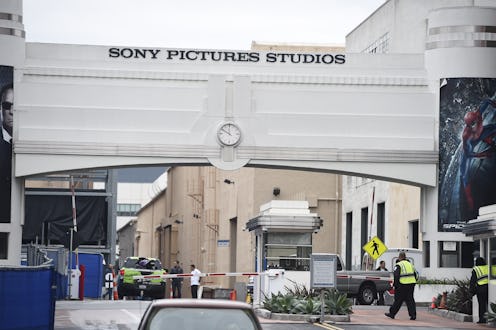News
The Sony Hack Emails Are Available On Wikileaks
The cyberattack against Sony Pictures Entertainment last year was one of the first times the public got a look behind the gilded curtain surrounding the exclusive club of movie studios and stars. Now, the site known for blowing the lid on classified government information — remember those confidential Iraq War logs leaked back in 2010? — has added the Hollywood hack to its archives. On Thursday, Wikileaks posted material from the Sony hack — 30,000 documents and 173,000 emails, to be exact — and made them available in an easy-to-search database. But at the time of its launch, at least some partial social security numbers were still accessible, a move that calls into question the ethics behind publishing leaked information.
For obvious reasons, Sony wasn't thrilled when emails between top movie execs dishing on movies and celebrities were suddenly blown wide open. We got a riveting insight into what caused Sony's Steve Jobs biopic to fall apart. According to the leaked emails, film producer Scott Rudin blamed Angelina Jolie, who he called a "minimally talented spoiled brat," and her insistence on using director David Fincher for her Cleopatra project. Fincher, according to the emails, had already been tied to the Steve Jobs picture. The unguarded conversations also spilled outside the movie studio. In one particularly embarrassing exchange, Rudin and then-co-chairman Amy Pascal made racially insensitive jokes about President Obama's movie preferences.
That kind of behind-the-scenes look made the hacked content appropriate to publish, according to a Wikileaks statement. The site argued the emails helped prove how a movie studio that manages multimillion-dollar projects politicked and rubbed shoulders with influential forces, which included ties to the White House. The statement also referenced U.S. officials' claim that North Korea led the attack due to the hackers' references to the controversial dark comedy The Interview, which parodied North Korean leader Kim Jong-un. That conclusion has since been dismissed, but the hack's ramifications on global politics also gave the site reason to publish the leaked files in the public's interest. Editor-in-Chief Julian Assange said in the statement:
This archive shows the inner workings of an influential multinational corporation. It is newsworthy and at the centre of a geo-political conflict. It belongs in the public domain. WikiLeaks will ensure it stays there.
But the massive breach that debilitated the studio for weeks also caused past and present employees to become unwitting casualties. The hack revealed tens of thousands of home addresses, phone numbers, and social security numbers. A basic search in Wikileaks showed partial social security numbers could still be accessed. In a statement provided to The Los Angeles Times, a Sony spokesperson blasted Wikileaks for participating in sharing what the studio viewed as stolen property and for endangering the safety of the studio's employees.
The attackers used the dissemination of stolen information to try to harm SPE and its employees, and now WikiLeaks regrettably is assisting them in that effort. We vehemently disagree with WikiLeaks’ assertion that this material belongs in the public domain and will continue to fight for the safety, security, and privacy of our company and its more than 6,000 employees.
Freedom of information is a worthy cause, but what about protecting the privacy of employees, those who became collateral damage in a corporate attack? Social security numbers, I would say, go too far.
